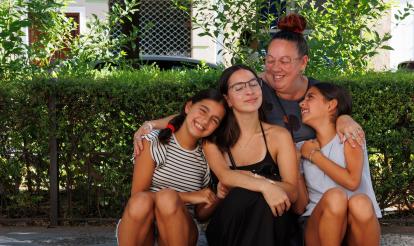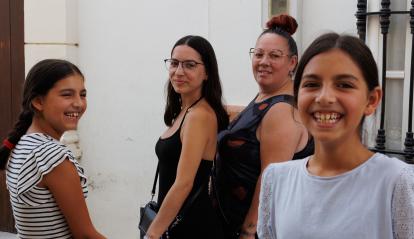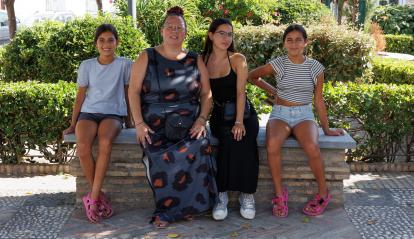
You are reading:

You are reading:

17.10.25
7 minutes readRaquel García, a woman from Seville, shows that perseverance and sustained support can break the cycle of social exclusion. She takes part in the CaixaProinfancia programme, which supports vulnerable families with underage children, through the Santiago el Mayor Women’s Association in Utrera, where many people like her find both refuge and a real opportunity to improve their future and that of their families.
Raquel speaks with ease and humour, despite her story being one of effort and determination to move forward. Born in Málaga, she arrived in the Seville town of Utrera 23 years ago with her son David, then just three years old: “I came here without a job, without knowing anyone. I had to start from scratch,” recalls this 45-year-old mother of five.
Faced with financial difficulties, Raquel did not hesitate to seek outside support. After learning at school about the possibility of aid for her son, she got in touch with the Santiago el Mayor Women’s Association, through which she gained access to the CaixaProinfancia programme of the ”la Caixa” Foundation, which works to improve the lives of children and young people in disadvantaged contexts.
Her first contact with the programme came in 2007, when David attended a summer camp. “It was a drastic change in my life. For my son it was a different kind of leisure opportunity, and from there we began with educational support classes. It opened up a whole new world for us.”
Since that summer, Raquel’s relationship with the association has remained constant. She and her children have benefited from various CaixaProinfancia services: educational support, psychological care and family workshops, among others.
Some needs arose along the way, such as speech therapy for her daughters. “The twins were able to go to the speech therapist for six years. That costs a lot of money, and here they received it without it costing us anything,” says Raquel, aware of the expense that accessing these services privately would have meant.
The Santiago el Mayor Women’s Association was founded in February 2001. “We saw that the queues for asking for help were endless,” recalls Inma Aguilar, the association’s director. “That’s why we decided to act against the spiral of poverty through training and employment.”
They began with sewing workshops and agricultural training for women, but soon realised that working with the whole family, especially with children, multiplied the chances of change.
For Aguilar, the key is helping them believe that change is possible: “If we can get families to see that they can move forward, that through training there’s a future, then they can make progress both economically and socially.”
The collaboration with CaixaProinfancia from 2007 marked a turning point. “We saw that what we were doing fitted in perfectly with the programme. We clicked in an extraordinary way,” recalls the director.

Today, CaixaProinfancia is present in 134 municipalities across Spain through more than 400 partner social organisations. Its goal is to break the intergenerational transmission of poverty by providing comprehensive support to families with children aged 0 to 18 at risk of social exclusion. In Utrera, the association offers practically all the services of the initiative: educational support, family learning workshops, speech therapy, therapeutic care, leisure and free-time activities, and summer camps and urban holiday programmes.
This support is provided progressively, through dialogue with families and the development of action plans. “Some come because they have a very specific need, but when you spend time with them you realise there are others,” explains Aguilar. “Sometimes, during leisure activities, a child might tell you that at home they’ve been using candles for two days because there’s no electricity. That’s something their parents might not explain.”
“Involving the whole family in the change is essential,” explains the director of the Association. “If they remain passive agents, nothing really changes. They have to get involved; this isn’t a play centre where you drop off your child and leave. Raquel is an example of that; she’s always willing to join in.”
Raquel has taken part in group therapy workshops which, according to the director, “are what really give her a boost.” These spaces address issues such as empowerment, self-esteem and family communication. “We work with families who had never sat down to talk and plan together before,” Aguilar adds.
The family educational workshops, where mothers and children participate together, have also been key for Raquel. “Each group works on the same topic separately and then they come together,” the director explains. Beyond the content, these spaces serve to build bonds among participants. “A sense of belonging to a supportive group is created. People call each other, keep each other company, meet up for a coffee. Many of them have no other support network to turn to when they need it.”

Sometimes, the barriers to benefiting from services of this kind are not bureaucratic, but rather are linked to life stages. That was the case with Nayara, one of Raquel’s older daughters, who resisted taking part during her teenage years.
“It was a really difficult age; she didn’t want to study or do anything,” recalls her mother. “I enrolled her in educational support because she needed it, but she didn’t want to go.” Her strategy was blunt: “I told her to come with me to work so she would know what life is like, and of course, she didn’t like it. That’s when she decided to continue with the programme.”
The change was palpable. “It took a lot of effort to get her to come,” Aguilar says. “She always said she didn’t need the extra help. But once she committed, everything improved. Now she’s a very mature young woman.”
Today, Nayara is studying for a degree in Pharmacy and has requested English tutoring within the same programme. For Aguilar, this is proof of something fundamental: “When there are expectations, there’s motivation to move forward. When there’s education, another world opens up.”
The ”la Caixa” Foundation joins the International Day for the Eradication of Poverty with the commitment to offer opportunities to those who need them most. Through its programmes, it promotes social and educational initiatives to break the cycle of poverty, exclusion and inequality, and to advance towards a fairer and more inclusive society.
The story of Raquel and her family shows that the right kind of support, sustained over time, can transform expectations and open up new opportunities. “They call me ‘the old one’,” jokes Raquel, “because my 27-year-old son was one of the first to join the programme.” Her bond with the association is so strong that she considers it her “second family”. “Whenever I’ve needed something, I’ve always gone to them. There are no words to express what they do.”
Although she is currently unable to work and her financial situation is difficult, Raquel remains optimistic. “My two eldest children didn’t finish their studies, but they’re working. Nayara is still studying and I hope the younger ones will too. Since they’ve been in the support programme, the difference is very noticeable.”
Raquel’s message to other families in a similar situation is clear: “Appreciate the effort made by the organisations and the help they provide. Times are tough, so that support is essential. It’s an opportunity for the whole family.” She ends the conversation with a sentence that sums it all up: “Write it in capital letters and nice and big: everything they do to help us is vital for our children to have a better future.”